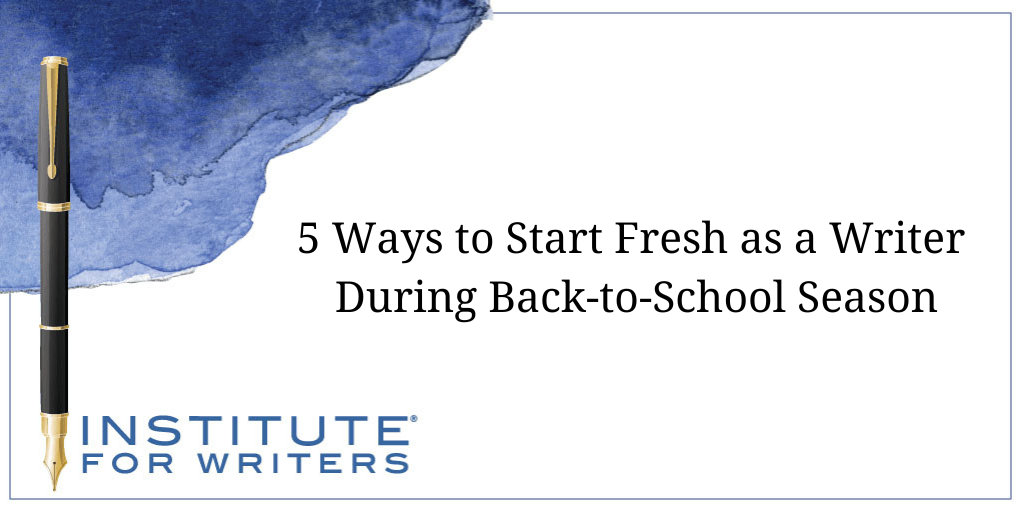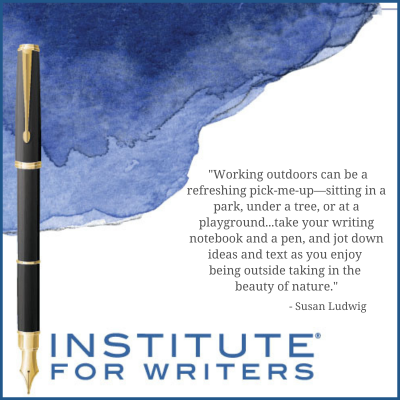
The Layers of Revision
To many, writing is revision, and most writers revise their manuscripts numerous times before they’ve shaped it into the best version that it can be.

It’s that time again – the start of the new school year. Even if you are not a teacher or student on your way back to the classroom, you can still join in with the excitement and new beginnings experienced in the days surrounding Labor Day.
 Getting into the back-to-school spirit is easy and you will soon realize that August is the best time to reset and reevaluate your writing schedule and maybe act a bit like a student yourself.
Getting into the back-to-school spirit is easy and you will soon realize that August is the best time to reset and reevaluate your writing schedule and maybe act a bit like a student yourself.
Here are five ways writers can start fresh during back-to-school season:
Start your back-to-school adventure by picking up a planner and some spiral notebooks. These are sold seemingly everywhere—online and in stores—often starting at the beginning of the summer and tend to be much less expensive than at other times of the year. Even if you buy them online, it’s fun to visit a store and check out the vast selection of supplies targeted at students—which often work well for writers, too. I usually buy a planner and a half-dozen spiral notebooks to use for my writing notes all year. Plus, I’ll replenish my supply of printer paper and pens while I can pick them up at a discount.
Planners available at this time of year generally begin with the month of August and go through to the end of next summer. Most of these scheduling notebooks have plenty of space for you to write deadlines (these may be imposed by you or by an instructor or editor), and your writing plans going forward. These pages are the best place to plan your schedule.
Just as students need a good workspace in their home to concentrate on their studies and homework, having a comfortable place to write is important for your own optimum productivity.
If you work at a desk or use a table as your workstation, take time in this back-to-school season to organize, throw out, and reassess what you have in your desk drawers or sitting around your work area. Find a place on part of the desk or table to place your planner so that you can readily view your schedule for the week ahead.
If you move around as you work, sometimes planting yourself at your kitchen table, a couch, or some other area in your home, you should still take the time to organize your supplies: your story planning notes, and your planner so that you can transport them easily to where you are working. Have a container or basket where you store everything you need for your writing.
 3. Venue
3. VenueAlthough it may be the most sensible and convenient situation to work from your workspace at home—especially in the early morning and late in the evening—consider changing your venue from time to time to refresh your mind and perhaps provide the needed environment for new ideas. You will want to have a backpack or other sturdy bag to load and carry your supplies.
There are many options of places to write for those times you leave your home base. Working outdoors can be a refreshing pick-me-up—sitting in a park, under a tree, or at a playground—with or without children in tow. You don’t always have to bring your laptop —just take your writing notebook and a pen, and jot down ideas and text as you enjoy being outside taking in the beauty of nature. Or before you leave home, you may want to print out a manuscript you are working on and think about ways to revise it.
Going to a coffee shop or sitting in a quiet place in the library are also good ways to change your perspective just a bit during your scheduled writing time. Consider your own backyard if you want to stay close to home.
All writers—beginning and even experienced ones—have times when they cannot think of what they want to write about, especially when they are not actively working on a manuscript, assignment, or project. Rather than just sitting and trying to come up with something, use a writing prompt to get your pencil (or your keyboard) moving. The Institute’s “12 Challenge” (12 months to write 12 writing prompts) provides good monthly prompts that can refresh your mind and get your words flowing.
 Working on a writing prompt can be time well spent not just to get thoughts on paper but reviewing what you wrote even just a few days later can provide ideas for a story or article that you did not previously consider. (Following the Institute on Instagram will provide you with this month’s prompt and the previous months too.)
Working on a writing prompt can be time well spent not just to get thoughts on paper but reviewing what you wrote even just a few days later can provide ideas for a story or article that you did not previously consider. (Following the Institute on Instagram will provide you with this month’s prompt and the previous months too.)
Writing contests are an excellent activity for those writers who are not currently working on a particular project or manuscript, or who want to add these due dates to their planner. Treat a contest as your homework and schedule time to get a good manuscript written. Use it as a writing prompt if you are looking for a topic to write about.
There is always a fun writing competition of some kind going on, and even if you don’t actually enter what you have written (although you certainly should) the guidelines and submission deadlines will be an excellent way for you to continue to plan and schedule your writing.
Start counting the days until the summer is over and vow this year to get caught up in the excitement of back-to-school. It is a refreshing way to enjoy your writing year ahead.
Susan Ludwig, MA has been an instructor with the Institute of Children’s Literature for over 17 years. Susan’s writing credits include teacher resource guides, English language learner books, and classroom curriculum for elementary through high school students. A former magazine editor, she assesses students’ written essays as a scoring director for the SAT exam. When she is not writing or working, she is usually found cooking or curled up with a good book.

To many, writing is revision, and most writers revise their manuscripts numerous times before they’ve shaped it into the best version that it can be.

We’re going to look at influential female authors of the past, those impacting the present, and whom the industry expects to make a big splash.

This week, we’re focusing on how we as writers can create strong female characters that others will look up to, instead of harmful stereotypes.
1000 N. West Street #1200, Wilmington, DE 19801
© 2024 Direct Learning Systems, Inc. All rights reserved.

1000 N. West Street #1200, Wilmington, DE 19801
© 2025 Direct Learning Systems, Inc. All rights reserved.

1000 N. West Street #1200, Wilmington, DE 19801
©2025 Direct Learning Systems, Inc. All rights reserved. Privacy Policy.
4 Comments